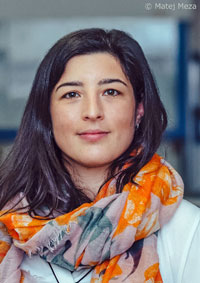05-BMG-SE2 Deep-Sea Sedimentology
Representative Elda Miramontes García
Continental margins and deep-sea basins are the largest zones of sediment accumulation in the world. Understanding the sedimentary processes involved in the transport of sediment from the continent to the deep sea has important implications for paleoclimatic and paleoceanographic reconstructions, biogeochemical cycles, ecosystem distribution, geohazards, infrastructure stability and hydrocarbon exploration. This module covers the description of the sedimentary processes and deposits that occur along continental margins and in the deep sea: deposits generated by gravity-driven processes (turbidites and submarine landslides), current-related deposits (contourites), pelagic and hemipelagic sedimentation, and cold water coral mounds. The students will learn to identify these types of deposits from different data sets (multibeam bathymetry, seismic data, sediment cores, well-logging and current measurements).
1) Recognise deep-sea depositional systems and comprehend the processes that control their formation
2) Identify independently deep-water depositional systems and their evolution based on their sedimentation patterns
3) Understand the role of oceanographic and climatic conditions, ocean productivity and tectonics in deep-sea sedimentation
4) Interprete the type of deep-water sedimentary system based on the combination different data sets (seismic data, multibeam bathymetry, sediment cores and well logs)
Course Type 1: Lecture (L) 3.0 SWS ( 42.0 h)
Course Type 2: Exercise (E) 1.0 SWS ( 14.0 h)
Tutorial(s): -
Workload:56.0 h presence time
64.0 h self-study
60.0 h exam workload
180 h total workload
combination exam
exam elements: 2
SL: 0
80 % written exam
20 % project exercise report
1) PICKERING, K.T., HISCOTT, R.N. 2016. Deep marine systems: processes, deposits, environments, tectonics and sedimentation. Wiley, Chichester, 672 pp.
2) HSÜ, K.J. 2004. Physics of sedimentology. Springer, Berlin, 240 pp.
3) MURRAY, R., WHEELER, A., FREIWALD, A., CAIRNS, S. 2009. Cold-Water Corals: The Biology and Geology of Deep-Sea Coral Habitats. Cambridge University Press.
Basic Data
Bachelor Marine Geosciences
Module Type
Compulsory
3. Year of Study
Offering Departement
FB5 Geosciences
Programs Using the Module
Bachelor Geowissenschaften
Sommersemester
Course LanguageGerman and English
6 CP
4 SWS
Contact

Contact
Prof. Dr. Elda Miramontes García
GEO 2560
 uni-bremen.de
uni-bremen.deContact

Contact
Prof. Dr. Elda Miramontes García
GEO 2560
 uni-bremen.de
uni-bremen.de
